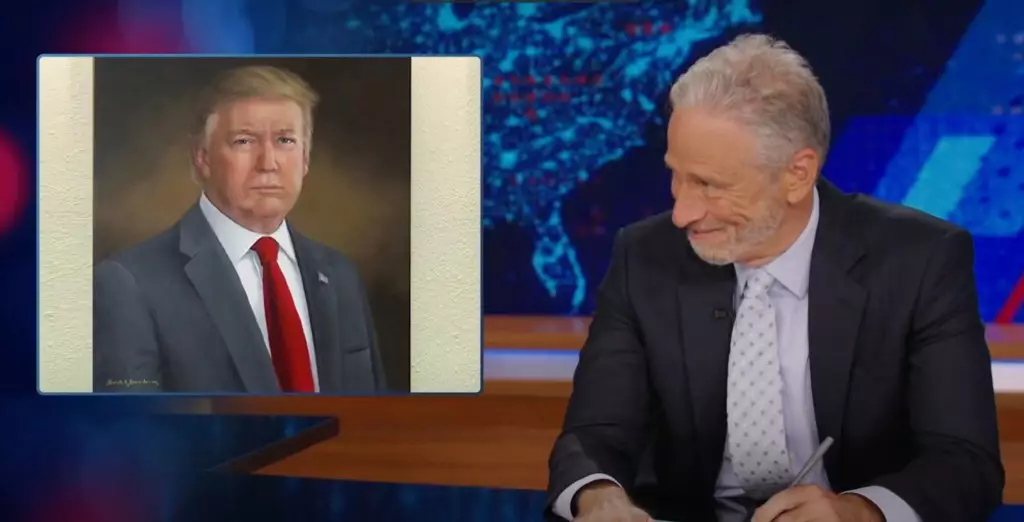In the realm of political satire, Jon Stewart stands out as a key figure capable of dissecting the absurdities of contemporary discourse with skillful wit. His recent monologue on *The Daily Show* serves as an apt illustration of how humor can overlap with serious commentary. During this episode, Stewart took aim at the glaring hypocrisy in how free speech is treated differently by various political factions, particularly focusing on the Republican Party’s disconnect between its avowed support for free expression and its behavior in practice. This duality presents a fascinating landscape for critique, wherein public figures often wield the concept of free speech as both shield and sword.
While humor is invariably subjective, Stewart taps into a collective frustration. His reference to Secretary of Defense Pete Hegseth’s embarrassing group chat misstep—where sensitive military discussions unceremoniously involve journalists—illustrates the sometimes ludicrous intersections of politics and media. It resonates with audiences who observe what seems like a diminishing of journalistic rigor amid sensational distractions, driven by an ever-entertaining media landscape. Here, Stewart wields the power of humor not only as entertainment but as a mirror reflecting societal dysfunction.
Echoes of Free Speech
Delving into the complexities of the free speech dialogue, Stewart astutely identifies the hypocrisy underpinning Republican rhetoric. His incisive commentary brings to light the ways in which political groups dance around principles they claim to uphold. For instance, Stewart highlights how conservatives under President Trump lambasted Democrats for employing what they referred to as “thought police,” while simultaneously indulging in censorship practices that stifle dissenting voices. It’s a contradiction that likely passes unnoticed by many, but Stewart’s clever observations force it into the public consciousness.
A key moment in Stewart’s critique revolves around Trump’s pointed attacks on mainstream media outlets. The former president’s calls for news organizations like ABC, CNN, and MSNBC to have their operating licenses revoked for deviating from his narrative starkly illustrate a selective commitment to free speech. “These guys don’t give a f*ck about free speech. They care about their speech,” Stewart asserts, encapsulating a critical sentiment that resonates with many viewers who feel the urge to challenge the status quo.
Cultural Commentary Through Irony
One of the most compelling aspects of Stewart’s approach is his ability to weave irony into cultural commentary effectively. His quips about popular reality television—such as *Watch What Happens Live* and *The Traitors*—serve as a reminder that entertainment and politics are inextricably linked. By lampooning these pop culture phenomena, he invites viewers to consider how media narratives shape public perceptions of free speech. If entertainment is the vessel through which political narratives are communicated, then it’s no surprise that absurdities abound. The irony is palpable; while advocating for free dialogue, figures in power frequently engage in theatrics that undermine the value they profess to cherish.
In one memorable moment, Stewart juxtaposes Trump’s demands regarding an “unflattering” painting in Colorado with the broader implications of political image management. This commentary expertly illustrates the extent to which public figures are willing to go to control their narratives—bringing to mind the contrasting notion that, in a truly free society, dissenting imagery is not simply tolerated but celebrated for fostering dialogue.
The Pursuit of Authentic Discourse
While Stewart’s humor evokes laughter, it simultaneously provokes a deeper contemplation about authenticity in public discourse. The notion that free speech should flourish in diverse formats, whether in a group chat or on television, speaks to a longing for genuine dialogue amid polarized rhetoric. It begs the question of how society can redefine its understanding of free speech in the context of competing narratives and hyper-partisanship.
In a time marked by social media dynamics that often favor outrage over reasonable dialogue, Stewart’s analyses highlight the dire need for a return to a culture of real conversation. The hypocrisy he unearths is not merely a partisan issue; it reflects a broader challenge where ideologies are cloaked in the language of freedom while practice suggests otherwise. It is this disconnect that will continue to fuel satire and, hopefully, inspire critical reflections on the nature of speech itself in American society.

